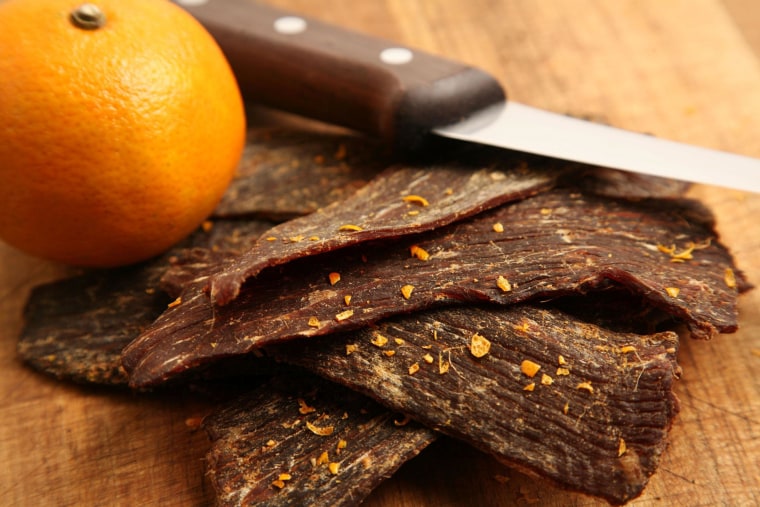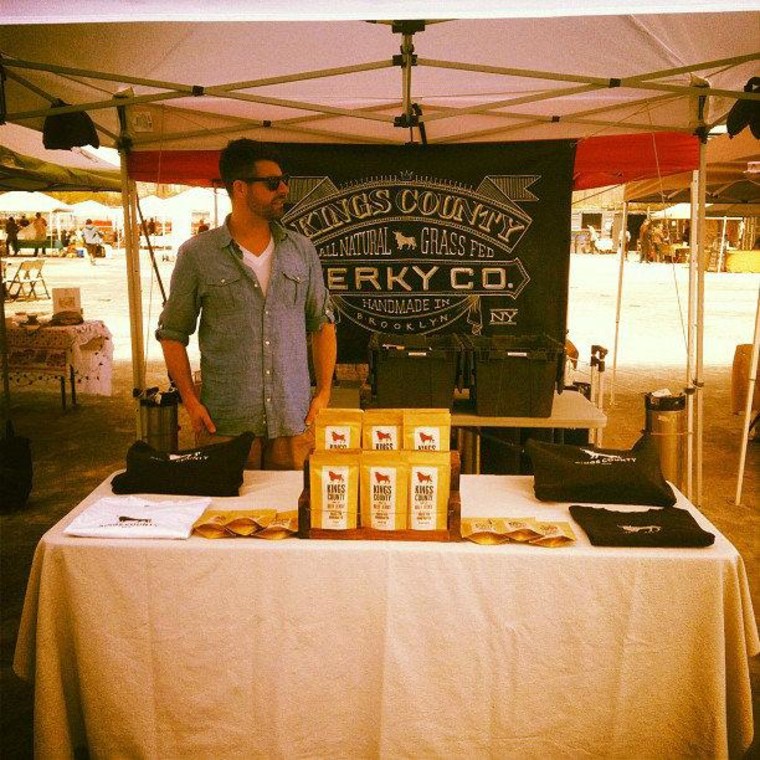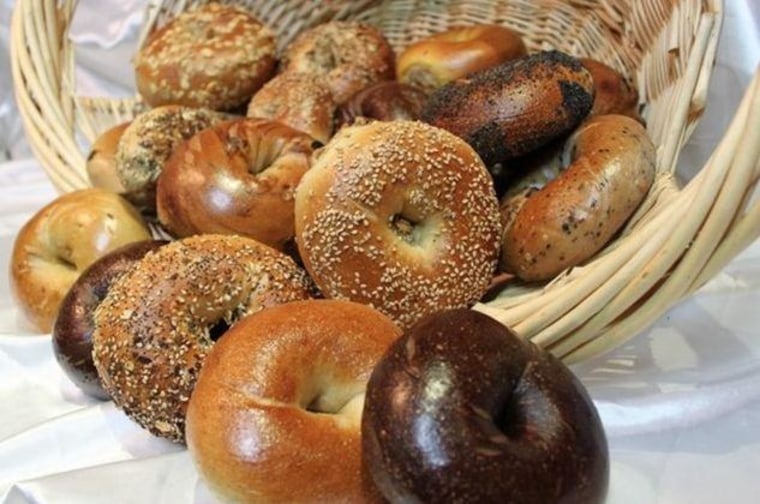Every week, Chris Woehrle of Brooklyn, N.Y., receives deliveries of 100 percent grass-fed beef from a local, organic, family-run farm. He says that when he gets the meat, it looks “just beautiful.” The first thing he does is break it down with his small team: The fat is trimmed off by hand and cut into slices, then slathered with a marinade made with fresh ingredients like sesame seeds and star anise, which have been toasted and ground by hand.
The beef is then laid into racks and loaded into dehydrators, an environment which, according to Woehrl, “creates a hot desert wind in a box.” It’s enough to dry the meat out, but not cook it.
The end product is a piece of Kings County Beef Jerky, a delicious but relatively unassuming piece of dried meat that’s part of artisanal Brooklyn, a movement that has spread far beyond New York – and infiltrated a number of recognizable brands like Fannie May chocolates, Vlasic pickles, Domino’s and Dunkin’ Donuts.
Last week TODAY.com covered artisanal mayo producer Empire Mayonnaise Co., a company that puts out innovative mayonnaise flavors. Readers were divided but interested, with many sharing their loyalty for brands like Hellmann’s.

In regard to the “artisanal” label, one reader commented: “I don’t know about anyone else, but I resent that type of marketing/pricing ploy.”
Not only are consumers skeptical about the integrity behind something labeled gourmet or artisan; small producers are wary of larger companies claiming artisan status. The very word “artisan” evokes bread baking in wood-fired ovens and the slow rotation of a hand-turned sausage-making machine. Merriam-Webster defines “artisan” as “one that produces something in limited quantities often using traditional methods.”
Many believe the term has been misappropriated so much that it has lost its meaning.
Even comedian Lewis Black got his two cents in on Tuesday night’s “Daily Show,” ripping into Dunkin’ Donuts’ artisanal bagels: “Really? Authentic bagels? Because unless you changed your name to Dunkin Donutsowitz at Ellis Island, then I doubt it."
Story: Dunkin' Donuts gets artsy with new line of bagels
Some, like Marc Fintz, vice president and business development manager for Davidovich Bagels in Woodside, N.Y., want to claim “artisanal” back from corporations. At Davidovich Bagels, dough is made in small batches and then shaped into bagels by “qualified craftspeople” who, according to Fintz, “use processes that are traditional and focus on individuals understanding the nature of the process and the desired end result. Their function is not simply to monitor gauges on an automated line.”
When Fintz saw that Dunkin’ Donuts had released an artisan bagel, he was shocked, and alleged that Dunkin’ Donuts had no right to the word if they were not following artisanal practices. He sent the company a cease-and desist-letter saying the word “artisan” is “a term of art with specific meaning, particularly in the baking world.” He also said that by Dunkin’ Donuts using the word it “creates the perception that your products are produced by hand, using traditional methods in small quantities. This is not the case.”
Dunkin’ Donuts responded, saying that the word “artisan” is “a common term used to describe quality food and authentic, traditional ingredients and taste. We therefore believe it is a fair and appropriate word to describe the line of bagels featuring our new bagel recipe."
Fintz filed state and federal complaints with the Federal Trade Commission and the New York state attorney general seeking that Dunkin’ Donuts halt its use of the ad campaign that identifies their bagel products as “artisan.”
“‘Artisan’ has a meaning in use,” Fintz told TODAY.com. “That meaning is a process. Your process is what’s artisan, not your flavor. There’s no such thing as an artisan recipe. It’s related to the actual, physical process.”
But Dunkin' Donuts insists their bagels can be called artisan. “At Dunkin' Donuts, we bake our bagels fresh every day in our restaurants and the specific process is proprietary,” a rep told us via email. “As the number one retailer of bagels in America, we also believe that the word ‘artisan’ underscores our long heritage of bagel innovation and leadership.”
Even though Dunkin' Donuts said the process of the bagel-making is "proprietary," TODAY.com requested more details. "The dough-making process uses traditional baking practices commonly seen in commercial kitchens to mix, form and proof the dough to achieve the desired bagel shape and texture," the company said.

I went to a Dunkin’ Donuts in Manhattan's East Village where their artisanal bagels were stocked. It was late in the afternoon, so only sun-dried tomato and pumpernickel flavors were left. I asked the woman behind the counter how the artisan bagels are prepared.
“I don’t make them,” she said. “They come in frozen and we put them in the oven.”
I have to admit that the sun-dried tomato artisan bagel was soft and moist with a good amount of chew – better than the regular Dunkin' Donuts bagels.
When Chris Woehrle of Kings County Beef Jerky spoke about the process of creating his products, he emphasized the handmade elements, as opposed to the mass-produced fare from large corporations. “Anytime you mention the word ‘factory,’ I think you give up the right to call yourself artisanal,” he said. “In a certain way it’s about scale and the hands-on relationship that the people who make it have with the product. In my mind, any kind of corporation using the word ‘artisanal’ is playing a branding and marketing game, and it’s not very honest at all about the process.”
Fannie May, a chocolatier that’s been providing sweet treats to American families since the 1920s, is one of the larger chocolate gift companies in the U.S., with 90 brick-and-mortar retail stores. Though a corporation by any definition, when Fannie May launched an artisan chocolate line, they did more than just swap a label and enlist a new PR team.
Watch most popular TODAY videos
Dave Taiclet, president of the gourmet food baskets group that oversees the Fannie May products, spoke with TODAY.com about their artisan line. “The reason why we believe we have permission to call it artisan (is that) it is something uniquely different than anything we’ve ever done in our history.”
The line was launched last October, and to prepare, the company hired pastry chefs rather than traditional confectioners and created a different manufacturing process that involved mixing bowls and stovetops. The company also built a new kitchen and nixed the enrobing line, a common industrialized process of coating candies with chocolate. They appointed chocolatier Norman Love to oversee the manufacturing and create more complex flavor profiles.
Another company, Vlasic, will be rolling out a new line of artisanal pickles called Farmer’s Garden by Vlasic in July across the country. The new line doesn’t have any artificial colors or additives (typical pickles churned out at most manufacturers like Vlasic have long been processed with Yellow No. 5, a dye that gives pickles the yellowy tinge that makes them appear brighter).
“That color itself is not very re-creatable in a natural format,” said Greg Greene, Vlasic’s brand manager. In contrast, he says, the Farmer’s Garden line of pickles “looks a little bit more like a cucumber than what people have come to realize.”
While some corporations seem to be backing up their “artisan” claims, others simply use the word as a marketing tool. Marc Fintz believes the is-it-or-isn’t-it artisanal conundrum can be solved with a little old-fashioned legal governance.
“I believe the issue would be clear-cut if there was a standard and a regulation,” Fintz said, pointing to the certification processes of products labeled kosher or organic.
One surefire clue if you’re looking for a truly artisan product? Head for the guy who’s not banging you over the head with the word “artisan.”
Directly across from one of the Dunkin’ Donuts I visited is a family-owned bagel shop called Ess-a-Bagel that has been baking bagels since the 1970s. Bagels were being pulled out of the oven when I walked in. Seriously. At this place, bagels are made from scratch every morning and baked throughout the day. Moses, the man in front of the oven, has been baking those bagels for 22 years.
When asked if the bagels were artisan, the man behind the counter responded, “I don’t even know what an artisan bagel is.”
More from TODAY Food:
